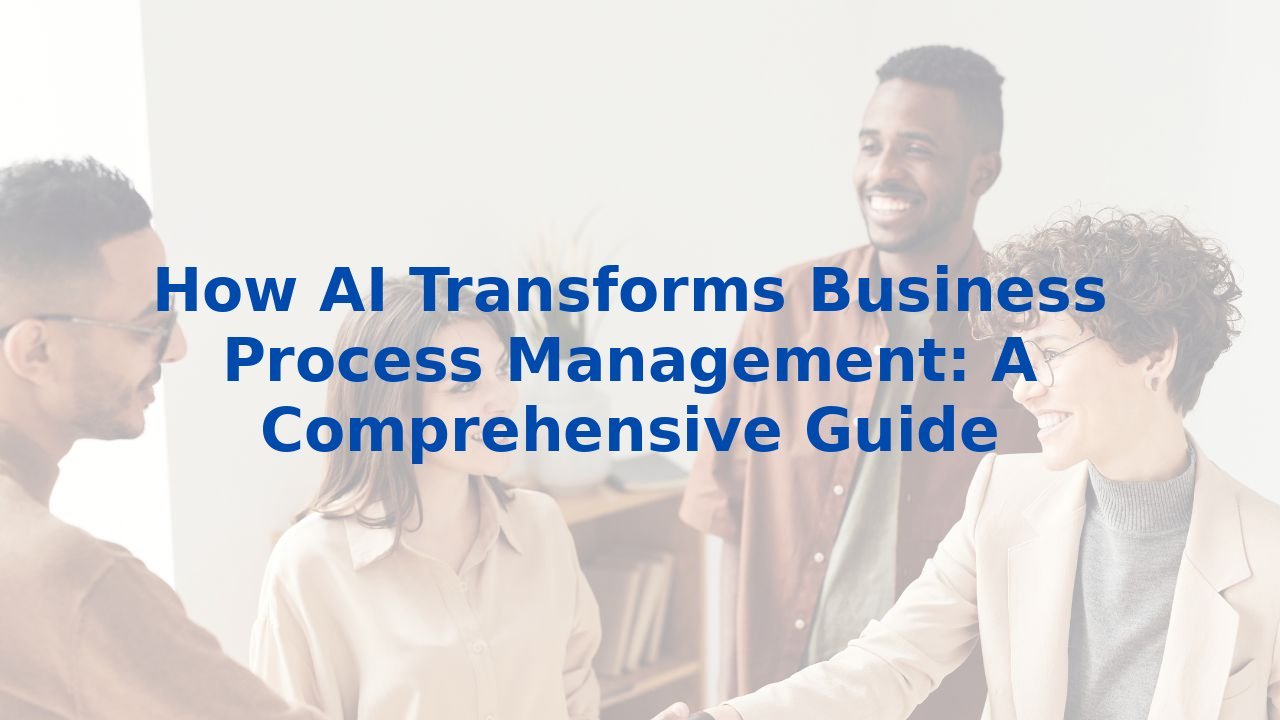How AI Transforms Business Process Management: A Comprehensive Guide
How AI Transforms Business Process Management: A Comprehensive Guide
Business Process Management (BPM) stands as the backbone of operational efficiency for organizations. The quest for streamlined workflows, reduced costs, and improved decision-making can often feel overwhelming. Enter artificial intelligence (AI), a transformative force that reshapes how businesses approach BPM. This guide explores how AI enhances various business processes, underscoring the myriad benefits that come with its integration.
1. Data Analysis and Insights
At the forefront of AI's capabilities lies its prowess in data analysis. By analyzing massive data sets, AI empowers businesses to make informed tactical and strategic decisions. Traditional data handling often leaves organizations grappling with delays and inaccuracies, but AI changes the game. It identifies trends, predicts outcomes, and even uncovers underlying issues, all while automating manual tasks. This agility in data analysis allows organizations to pivot swiftly in response to market shifts and customer demands, sharpening their competitive edge.
2. Process Building and Automation
AI's ability to create new processes based on set parameters revolutionizes process building and automation. Imagine automating mundane tasks such as document processing and administrative duties—this is where AI shines. Intelligent Document Processing (IDP) harnesses the power of AI to convert unstructured documents into actionable data, eliminating manual input errors while boosting productivity. Organizations can reclaim valuable time and resources, focusing instead on strategic initiatives.
3. Enhancing Decision-Making
Decision-making becomes more robust with AI’s ability to digest complex information. By processing structured and unstructured data from various sources, AI extracts critical insights and simulations of alternative scenarios. Decision-makers can thus base their choices on comprehensive data analysis and risk assessments. The result? Enhanced clarity in decision-making and a higher likelihood of favorable outcomes.
4. Improving Customer Service
AI's potential to elevate customer service is remarkable. By automating responses to common inquiries, businesses can significantly improve customer engagement. AI solutions can evaluate customer service interactions with precision, identifying areas needing enhancement and ensuring top-notch service delivery. This leads to a noticeable boost in overall customer satisfaction—a priceless asset for any organization.
5. Optimizing Product Development
In the realm of product development, AI stands out for its ability to streamline processes. Generative design, powered by AI, enables businesses to explore various design options without the resource burden of physical prototypes. Predictive modeling can simulate the ramifications of design decisions, ensuring that the end product aligns with organizational goals and specifications. The result is a more efficient development lifecycle that reduces time to market and conserves resources.
6. Streamlining HR Processes
AI's impact extends to human resources, where it can redefine recruitment and onboarding. By conducting initial candidate assessments, AI reduces the time and resources spent on interviewing. This automation not only accelerates hiring but also enhances the personalization of employee career paths. With a focus on enhancing employee experience, organizations can foster a motivated and capable workforce.
7. Enhancing Sales and Marketing
Sales and marketing processes are elevated through the insights AI analytics provides. By predicting potential high-revenue customers, AI can inform organizations about the most effective strategies to engage prospects. Personalized sales journeys, powered by AI-driven chatbots, can significantly enhance revenue generation and audience engagement. Organizations can create tailored experiences that resonate with their target demographics.
The Benefits of Training Your Employees for AI
While AI’s contributions to BPM are profound, it is essential to recognize the human element in this transformation. Training employees to harness the power of AI streamlines its implementation. Here are a few benefits of investing in employee training:
- Adaptability: Employees equipped with AI knowledge navigate new tools and technologies with ease, fostering a smoother integration process.
- Efficiency: A well-trained workforce can automate tasks effectively, freeing up time for higher-value activities.
- Decision-Making: Trained employees can better interpret AI-generated insights, leading to more informed and impactful choices.
- Innovation: Knowledgeable employees can identify avenues for innovation, driving continuous improvement within organizations.
Conclusion
AI has revolutionized business process management by enhancing various dimensions like data analysis, automation, decision-making, customer service, product development, and HR processes. The interplay between AI and employee training is pivotal in achieving significant gains in operational efficiency. Without doubt, AI serves as a strategic partner—its integration, when combined with a skilled workforce, positions organizations for long-term success and competitiveness. Embracing these advancements today will prepare businesses to thrive in the ever-evolving landscape of tomorrow.
For organizations ready to take the next step, consider equipping your entire workforce with AI skills through comprehensive training programs. Explore the breadth of opportunities available to ensure your organization not only keeps pace but leads in the realm of BPM.



